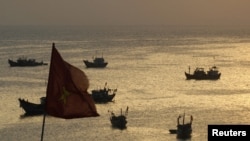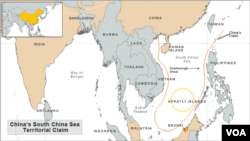HANOI - Vietnam’s new Law on the Sea, passed last week, has sparked a fresh round of tensions with China about competing territory in the South China Sea.
When Vietnam’s National Assembly passed the law on June 21, the reaction from China was immediate and aggressive.
The law states Vietnam’s sovereignty claims of the Spratly and Paracel islands, territory believed to be rich in oil and minerals, and also claimed by its larger neighbor. Beijing says the law is illegal and called in Vietnamese ambassador Nguyen Van Tho to protest.
Analysts have said the move is directed more towards engaging Vietnamese public opinion, rather than stirring ire with China. Last year, hundreds of protesters took to the streets for weeks of rare demonstrations in Vietnam, protesting Chinese aggression against Vietnamese oil exploration vessels.
Nguyen Quang Thach, a resident of Hanoi, was at the protests last year. He says he welcomes the new law.
"I’m happy with this because we know the demarcation of our sea territory and it’s a good way to send a message to other countries that we have the law and regulations," he said.
The face-off with China quickly escalated. The same day Vietnam passed the Law on the Sea, China’s Foreign Ministry announced it had raised the level of governance on three groups of islands in the South China Sea from county to prefectural level, under the control of Sansha city.
The seat of government will be on Woody Island, which is part of the Paracels, an area China took from what was then South Vietnam in 1974.
Sansha city has been in the works for some time, says Jennifer Richmond, China director for the security analysts firm Stratfor, which made it easy to bring up in response to Vietnam’s new law.
"Sansha city is not a new concept. In fact I think they started thinking about this back in the late 50s and 60s. So what they have done is they had always had a county administrative area," said Richmond. "What they are trying to do now is make it a prefecture administration with some territorial claim."
Richmond says the announcement was made in reaction to the new law, but is not directed entirely at Vietnam. Instead, she says it was part of a public relations exercise aimed at the Chinese public as the country gets ready for a leadership transition.
Vice President Xi Jinping is expected to take control from Hu Jintao as head of the Communist party later this year. In the meantime, the government’s main concern is to remain strong and be seen as unified to make sure the transition is as smooth as possible. Richmond says the strategy is not unique to China.
"Vietnam, the Philippines and China, particularly Vietnam and China, are masters at doing this. When they’ve got domestic problems that are weighing on them, a lot of times they will create international situations that will take the heat off the state," she said.
She says there will likely be more skirmishes with China about territory in the sea. However, Richmond says they will likely be more reactive than proactive.
The announcement of Vietnam's new law was briskly followed by yet another skirmish.
On Saturday, state-owned China National Offshore Oil, known as CNOOC, invited foreign firms to bid on energy exploration in nine lots off the coast of Vietnam.
Vietnam’s Foreign Ministry calls the move illegal and says the lots set aside by China were entirely within Vietnam's 200 nautical mile exclusive economic zone and contitnental shelf, as laid out in the Untied Nations Law on the Sea.
Richmond says the moves lifted tensions, but remain part of a well-worn pattern of threats and counter-threats and raises the level of rhetoric even higher.
When Vietnam’s National Assembly passed the law on June 21, the reaction from China was immediate and aggressive.
The law states Vietnam’s sovereignty claims of the Spratly and Paracel islands, territory believed to be rich in oil and minerals, and also claimed by its larger neighbor. Beijing says the law is illegal and called in Vietnamese ambassador Nguyen Van Tho to protest.
Analysts have said the move is directed more towards engaging Vietnamese public opinion, rather than stirring ire with China. Last year, hundreds of protesters took to the streets for weeks of rare demonstrations in Vietnam, protesting Chinese aggression against Vietnamese oil exploration vessels.
Nguyen Quang Thach, a resident of Hanoi, was at the protests last year. He says he welcomes the new law.
"I’m happy with this because we know the demarcation of our sea territory and it’s a good way to send a message to other countries that we have the law and regulations," he said.
The face-off with China quickly escalated. The same day Vietnam passed the Law on the Sea, China’s Foreign Ministry announced it had raised the level of governance on three groups of islands in the South China Sea from county to prefectural level, under the control of Sansha city.
The seat of government will be on Woody Island, which is part of the Paracels, an area China took from what was then South Vietnam in 1974.
Sansha city has been in the works for some time, says Jennifer Richmond, China director for the security analysts firm Stratfor, which made it easy to bring up in response to Vietnam’s new law.
"Sansha city is not a new concept. In fact I think they started thinking about this back in the late 50s and 60s. So what they have done is they had always had a county administrative area," said Richmond. "What they are trying to do now is make it a prefecture administration with some territorial claim."
Richmond says the announcement was made in reaction to the new law, but is not directed entirely at Vietnam. Instead, she says it was part of a public relations exercise aimed at the Chinese public as the country gets ready for a leadership transition.
Vice President Xi Jinping is expected to take control from Hu Jintao as head of the Communist party later this year. In the meantime, the government’s main concern is to remain strong and be seen as unified to make sure the transition is as smooth as possible. Richmond says the strategy is not unique to China.
"Vietnam, the Philippines and China, particularly Vietnam and China, are masters at doing this. When they’ve got domestic problems that are weighing on them, a lot of times they will create international situations that will take the heat off the state," she said.
She says there will likely be more skirmishes with China about territory in the sea. However, Richmond says they will likely be more reactive than proactive.
The announcement of Vietnam's new law was briskly followed by yet another skirmish.
On Saturday, state-owned China National Offshore Oil, known as CNOOC, invited foreign firms to bid on energy exploration in nine lots off the coast of Vietnam.
Vietnam’s Foreign Ministry calls the move illegal and says the lots set aside by China were entirely within Vietnam's 200 nautical mile exclusive economic zone and contitnental shelf, as laid out in the Untied Nations Law on the Sea.
Richmond says the moves lifted tensions, but remain part of a well-worn pattern of threats and counter-threats and raises the level of rhetoric even higher.





